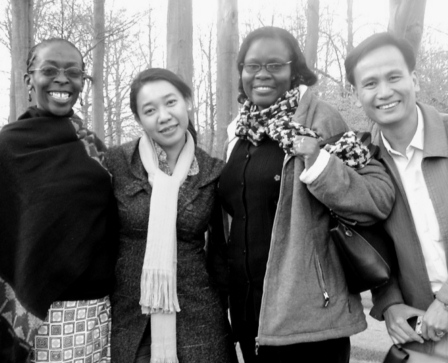An Asian Advocate in Amsterdam
Intense Discussions on Treatment Access by Global Activists at Dutch Meeting
July 2007—For Ayi Farida, life on the front lines of the fight against HIV/AIDS often means long hours in the jungles of Indonesia's Papua province, explaining treatment to patients who may not be able to read or write. But in March she traveled to the Netherlands, along with almost thirty other treatment advocates from around the world, for the first of four annual meetings aimed at galvanizing key members of civil society to work on treatment access. Ayi, a member of TREAT Asia's Asian Community for AIDS Treatment and Advocacy (ACATA), kept a diary recounting her experiences at the Roundtable Process meeting, sponsored by the Netherlands Ministry of Foreign Affairs.
Monday 27 March 2007After a six-hour flight from Papua to Jakarta, one-and-a-half hours from Jakarta to Kuala Lumpur, and fifteen hours more to Amsterdam, I finally set foot in the Netherlands at 7:00 this morning. A very cold wind greets me as I walk from the airport to the parking lot. Outside, the temperature is 6 degrees C-very scary for someone like me who comes from a place where the average temperature is 31 degrees C. My taxi driver is fascinated to meet an Asian girl from the other side of the world. He keeps asking me about living conditions in Papua and as I answer he stares as if I come from another planet.
The Roundtable Process meeting I'm attending is being held in the little town of Noordwijk on the Dutch shore. By the time we gather I'm very groggy-almost 23 hours in the air is taking a toll. The facilitator explains that the Roundtable Process is designed to provide community groups from around the world with a chance to strengthen their role in scaling up HIV/AIDS treatment and care. The meeting is a space for collaborating informally, with the goal of supporting universal access to HIV treatment…or something like that! I don't have the energy to talk or even think, and I feel like my brain is freezing. We adjourn until tomorrow.

Ayi Farida (second from left) encountered treatment advocates from Africa, the Philippines, and around the world at Amsterdam's Roundtable Process meeting. |
Tuesday 28 March 2007This morning I'm full of energy and ready to start. We begin with presentations by highly experienced senior activists who cover stigma and discrimination, gender dynamics, drug procurement, and sustainability of funding. For a young activist like me, today is really a great show. Listening to different opinions and experiences from other organizations around the world gives me new ways of seeing things beyond the Asian point of view. And I learn about the best practices directly from experts.
In the afternoon, the organizers take us to see a huge garden called Keukenhof, where you can find any kind of flower, including the famous tulip. Living in a place where flowers are scarce, I am mad running around taking pictures and discussing the plants with my Vietnamese friend. Some of our colleagues continue discussions about gender dynamics and another group sits in a café discussing stigma and discrimination-very intense conversations!
Wednesday 29 March 2007
After lots of debate yesterday, we identified three key issues for global advocacy-sustainability of funding, stigma and discrimination, and drug procurement. So today we divide ourselves into three small groups and consider what we want to achieve.
I join the procurement group. Our discussion focuses most on patents because of Abbott Laboratories' recent decision to withdraw seven new drugs from entry into the Thai market. We all believe that Abbott's actions are designed to retaliate against the Thai government for issuing compulsory licenses for the HIV drug Kaletra and a heart drug. We agree that civil society around the world should support the activists in Thailand who are trying to pressure drug companies to lower their prices. But some point out that in many places, people are unfamiliar with the technical issues surrounding generics, patents, and intellectual property rights. Many people living with HIV/AIDS don't know much about generics beyond the generic drugs they're taking now.
For the short term we agree that we will aim to raise awareness within civil society about patent issues and at some point take action to support Thailand in the Abbott case. Our long-term goal will be to advocate for the World Trade Organization to revisit the international trade agreement that protects patents on essential drugs.
After the session today, some of us decide to visit Amsterdam and have some fun. On our way there, we keep talking about gender dynamics and other issues, and one guy even suggests we visit an NGO in Amsterdam instead of seeing the red-light district. That's too serious! If we want to continue discussing gender dynamics, we can talk about how gender inequalities contribute to prostitution. In the end, we see the red-light district and even look in on one of the famous marijuana coffee shops.
This has been a long trip for me but it's been worth it. I am so inspired by the passionate activist spirit I encountered! This is something I rarely experience back at home, where we're working too hard to step back and reflect on the global fight against HIV/AIDS.